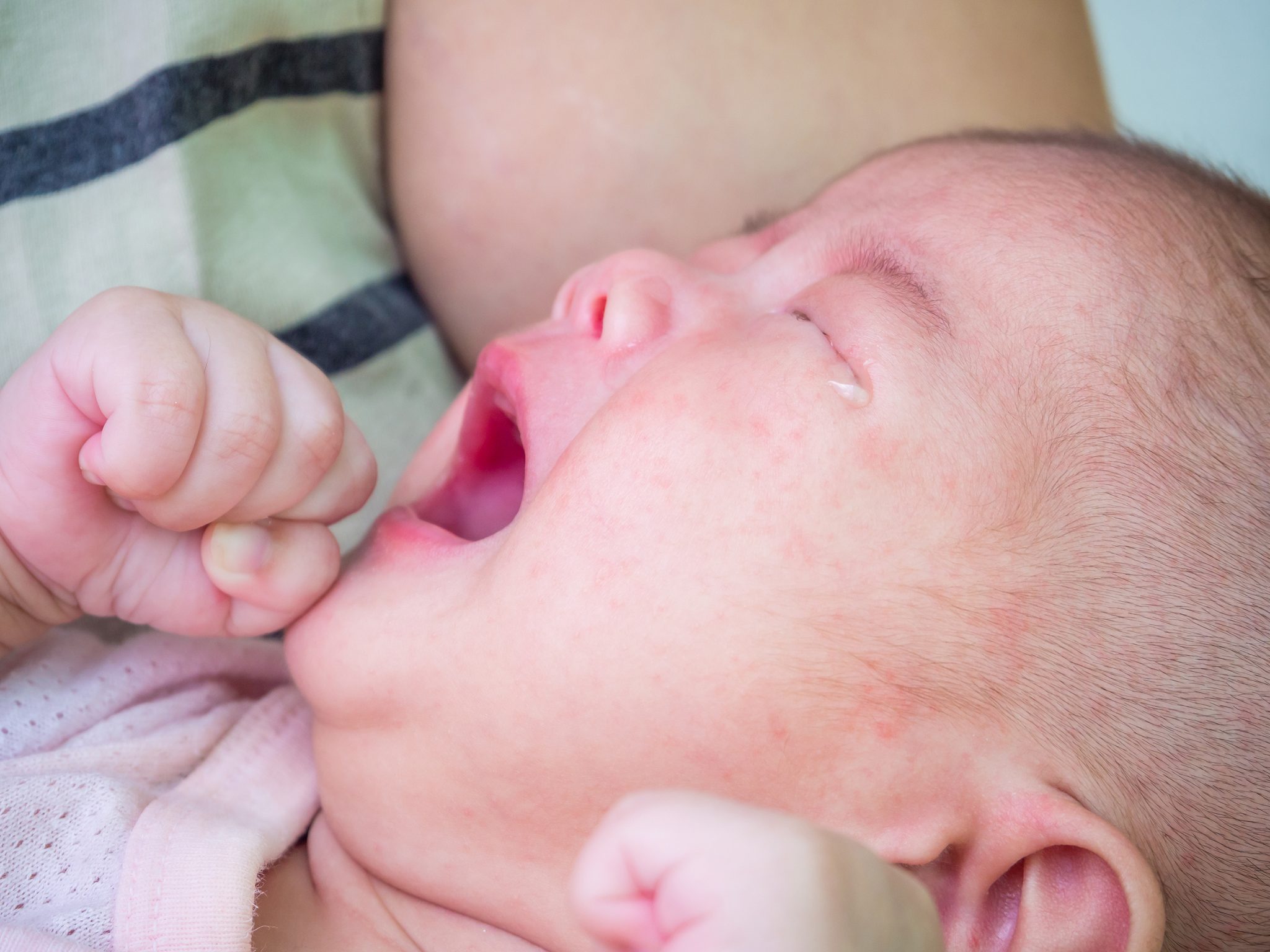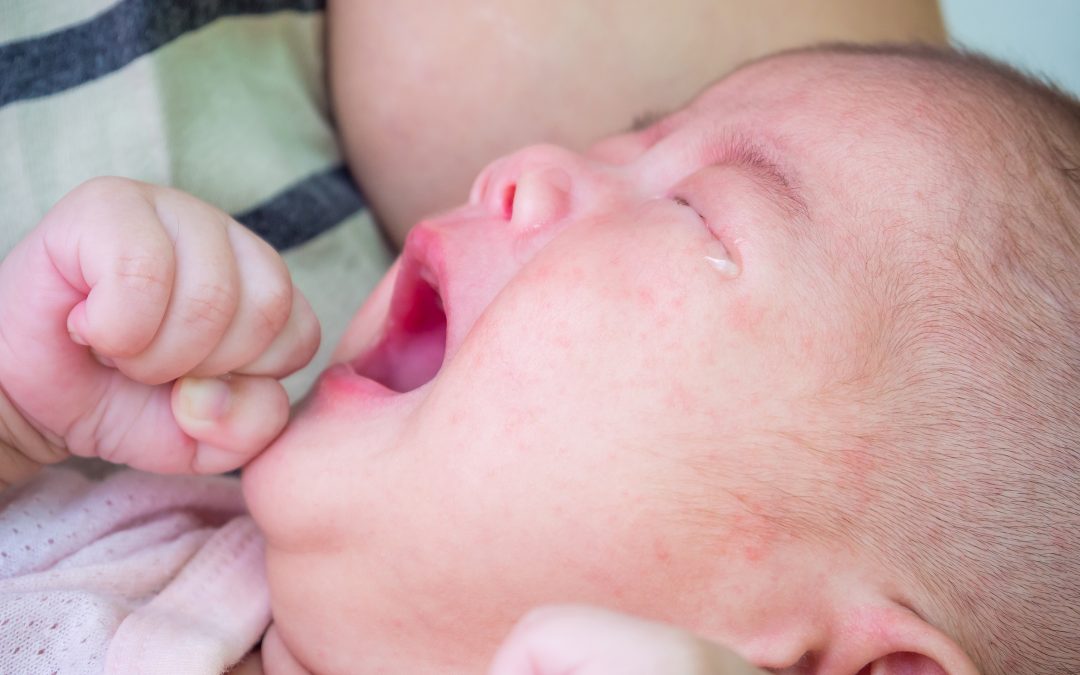
Though allergies are becoming increasingly common in children, most breastfeeding babies don’t have any allergy problems when nursing. Studies show that only two to three babies out of every 100 who are exclusively breastfeeding will have an allergic reaction. If your baby does have allergies, it’s normal to wonder if you will be able to continue to nurse him or her. With some modifications, you can still successfully breastfeed your little one.
Why Do Allergies Occur in Babies?
An allergy occurs when your baby’s immune system determines that a harmless substance is an invader. The immune system reacts to this invader by producing large amounts of antibody immunoglobulin E (IgE). When your baby consumes the allergic food, the IgE attaches itself to your little one’s blood and tissue, causing an inflammatory response in your baby.
Your baby is most likely to have an allergic reaction to food that is introduced to him or her early and often. This is why the American Academy of Pediatrics recommends that babies don’t start on solid foods until at least six months of age. When you exclusively breastfeed your little one, he or she is only exposed to the food that you eat which is secreted in your breast milk, reducing their risk of having an allergic reaction.
How to Tell if Your Baby Has Allergies
If your baby does have an allergic reaction, it’s important to know the signs so that your little one can get the help he or she needs. These signs may include:
- Abdominal pain or discomfort
- Severe colic
- Skin rash, such as eczema or hives
- Diaper rash that doesn’t go away
- Severe diarrhea that may contain a small amount of blood
- Vomiting
- Breathing problems that last for several hours after feeding
- Extreme fussiness after nursing
- Crying inconsolably for long periods of time
- Cold-like symptoms, such as congestion
- Dry, itchy skin
- Red, itchy eyes
- Constipation
Allergies Or Food Sensitivities
If your baby has an allergic reaction to something that was secreted in your breast milk, his or her immune system caused the reaction. A food sensitivity is caused by a reaction from the baby’s digestive system. Chocolate, broccoli, beans and spicy foods are common foods that your little one may be sensitive to you eating but aren’t true allergies.
Determining if Your Baby Has an Allergy
The more of the allergic food that you ate, the bigger the reaction that your little one will exhibit. Most allergies will manifest themselves within four to 24 hours after your little one nursed, which can make pinpointing the allergen difficult.
Most babies who have allergic reactions when breastfeeding are allergic to cow’s milk. Soy, corn, wheat, eggs and peanuts can also cause a reaction in your little one. If there are allergies in your family, your baby is more likely to be allergic to this food.
Your baby’s pediatrician may ask that you keep a journal that details what you eat every day along with any symptoms that your baby has and at what times your little one displayed the symptoms. This can help your pediatrician determine the allergen.
Things to Keep in Mind When Breastfeeding a Baby with Allergies
You can still have a wonderful breastfeeding experience with your little one if he or she has allergies. Once the allergen has been determined, your pediatrician may recommend that you “pump and dump” for a period of time. This means that you will pump your breast milk and then dump it down the drain in order to prevent your little one from consuming the allergen.
Once you know what food or foods your little one is allergic to, it’s important to eliminate these from your diet completely. Carefully check food labels to ensure that no small amounts of the allergen are listed as an ingredient. Your pediatrician may recommend you take certain vitamin supplements to ensure you continue to meet your daily nutritional needs while certain foods are removed from your diet.
What to Do if Your Baby Has an Allergic Reaction
If your baby is having a strong allergic reaction, such as hives or breathing difficulties, call your child’s pediatrician immediately. They may advise that you bring your child to the hospital for immediate help. Smaller reactions, such as a diaper rash or fussiness, can be handled with at-home remedies while you work on determining the allergen and eliminating it from your diet.
Talk with Your Baby’s Pediatrician
Allergic reactions can be serious, so it’s important to call your child’s pediatrician if he or she exhibits any signs of an allergy. Allergy tests are often unreliable in babies, so the pediatrician will most likely recommend you keep a journal. If your baby has a food allergy, he or she may also develop a cross sensitivity to other foods because of his or her food allergy. Your pediatrician can help determine if this is occurring.
As a mom, you want what’s best for your baby, so it can be extremely emotional seeing your child suffer due to a food allergy. Finding the allergen or sensitivity can take some time, so be patient during the process and know that you are doing your very best for your little one.


 Complete Our Simple Online Form
Complete Our Simple Online Form We’ll Handle All The Paperwork
We’ll Handle All The Paperwork Receive Your Free Ameda Pump
Receive Your Free Ameda Pump